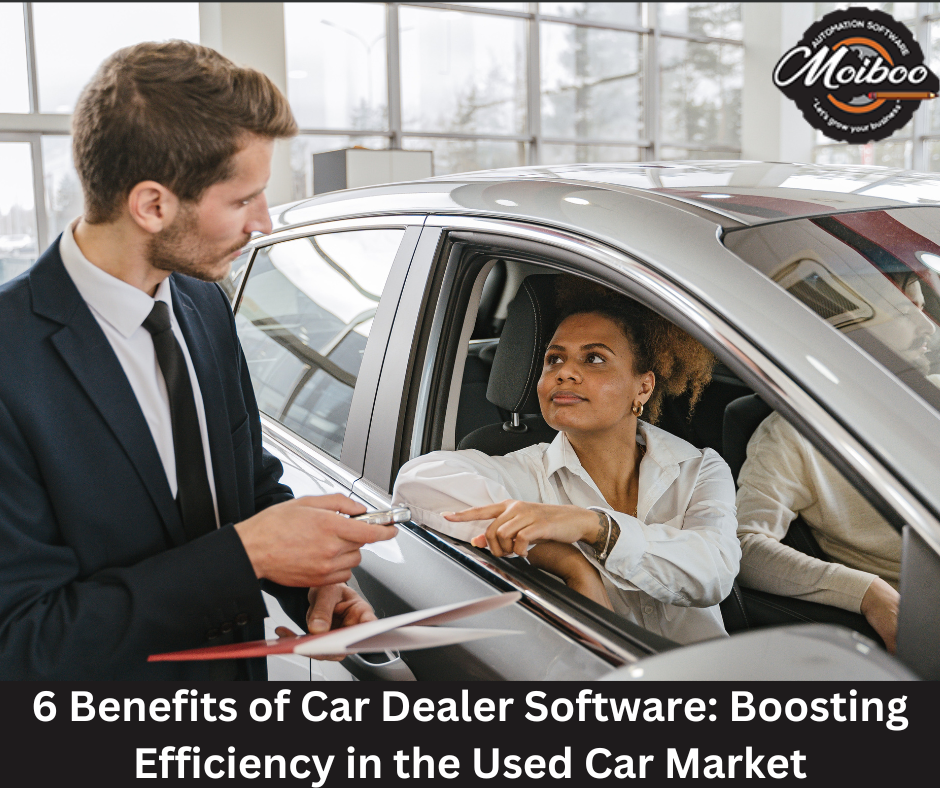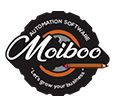Introduction
In the fast-paced world of the used car market, efficiency is key to staying competitive. Car dealer software has emerged as a game-changer, revolutionizing the way dealerships operate and improving their overall efficiency. This comprehensive software suite streamlines various aspects of car sales, enabling dealers to automate tasks, manage inventory effectively, enhance customer experiences, and make informed decisions.
In this blog, we will explore six key benefits of car dealer software and how it contributes to boosting efficiency in the used car market.

Streamlined Inventory Management
Managing a large inventory of used cars can be a daunting task for dealerships. Car dealer software simplifies the process by providing a centralized platform for inventory management. With this software, dealers can efficiently track and organize vehicles, including their specifications, pricing, history, and availability.
The software can automatically update the inventory across multiple channels, such as websites and third-party platforms, ensuring accurate and real-time information for potential buyers. This streamlining of inventory management saves time, reduces errors, and allows dealers to respond quickly to customer inquiries, ultimately boosting efficiency.
Improved Sales Process
Car dealer software enhances the sales process by automating and digitizing various stages. From lead generation to closing the deal, the software facilitates seamless communication and collaboration among sales teams. It enables sales representatives to access customer information, vehicle details, and sales history, empowering them to provide personalized experiences and make informed recommendations.
Additionally, the software can automate follow-up processes, send reminders, and schedule appointments, ensuring that no leads slip through the cracks. By automating these tasks, car dealer software streamlines the sales process, allowing dealerships to handle a higher volume of customers efficiently.
Enhanced Customer Relationship Management (CRM)
Maintaining strong customer relationships is crucial for success in the used car market. Car dealer software comes equipped with robust CRM functionalities that enable dealerships to effectively manage their customer interactions. The software consolidates customer data, including contact information, preferences, purchase history, and service records, in one place.
This centralized information helps dealerships provide personalized customer experiences and build long-term relationships. With car dealer software, dealers can track customer inquiries, respond promptly, and nurture leads, leading to increased customer satisfaction and loyalty. By streamlining CRM processes, the software enhances efficiency and fosters better customer relationships.
Efficient Documentation and Reporting
Car dealer software eliminates the hassle of manual paperwork and provides efficient documentation and reporting capabilities. It automates tasks such as generating invoices, sales contracts, and other necessary documents, reducing errors and saving time.
Additionally, the software generates comprehensive reports on sales performance, inventory turnover, and customer analytics. These reports offer valuable insights that help dealerships make data-driven decisions and optimize their operations. By streamlining documentation and reporting, car dealer software improves efficiency and enables dealerships to focus more on selling and servicing cars.
Integration with Online Marketplaces
In today’s digital age, online marketplaces play a significant role in the used car market. Car dealer software seamlessly integrates with popular online platforms, allowing dealerships to list their inventory, manage inquiries, and communicate with potential buyers all from a single interface.
This integration eliminates the need for manual data entry and synchronization, reducing errors and saving time. Dealers can efficiently reach a wider audience and attract more potential buyers, ultimately increasing sales and efficiency.
Analytics and Insights
Car dealer software provides powerful analytics and reporting features that offer valuable insights into dealership operations. It tracks key performance indicators, such as sales conversion rates, average days in inventory, and gross profit per vehicle, allowing dealerships to identify areas for improvement.
Conclusion:
Car dealer software is a game-changer in the used car market, providing numerous benefits that boost efficiency for dealerships. From streamlined inventory management to improved sales processes, enhanced customer relationship management, and efficient documentation and reporting, the software simplifies and automates crucial tasks, saving time and reducing errors.
Integration with online marketplaces expands reach and attracts more potential buyers. Furthermore, the analytics and insights offered by the software enable data-driven decision-making, optimizing operations, and driving success. As the used car market continues to evolve, car dealer software proves to be an indispensable tool for dealerships looking to stay competitive, efficient, and profitable.

If you’re looking for car dealer software that qualifies for the PSG Grant and provides pre-approved solutions, look no further than Moiboo car dealer software. This software is specifically designed to cater to the unique requirements of your business, offering a comprehensive range of features to automate and streamline your operations.
Moiboo car dealer software ensures a seamless workflow from start to finish, optimizing every aspect of your business processes. To fully understand the extensive benefits it offers, we encourage you to click the link provided and request a free demo.
To learn more and schedule your complimentary demo, you can contact us at +65 9895 1817. Our team is ready to assist you in exploring the capabilities of Moiboo used car dealer software and how it can revolutionize the efficiency and overall success of your dealership.

FAQS:
What are the different segments within the used car market?
The used car market can be segmented into various categories based on factors such as vehicle type, price range, age, mileage, and brand preference. Vehicle type segmentation includes segments such as sedans, SUVs, hatchbacks, and trucks.
Price range segmentation categorizes cars into different price brackets, such as budget cars, mid-range cars, and luxury cars. Age and mileage segmentation divides used cars into different categories based on their years of usage and the distance they have traveled.
Additionally, brand preference segmentation takes into account the popularity and reputation of different car brands among buyers. These segments provide buyers with options that align with their preferences, budget, and specific requirements when purchasing a used car.
Who are the target audience for used cars?
The target audience for used cars is diverse and includes individuals from various demographics and socioeconomic backgrounds. Potential buyers of used cars typically fall into categories such as first-time car buyers, young professionals, families seeking affordable transportation, individuals with budget constraints, and those looking for specific vehicle types or brands.
Additionally, used cars often appeal to customers who prioritize value for money, depreciation savings, and a wider selection of models compared to new cars. The target audience for used cars is vast, encompassing individuals who seek reliable and cost-effective transportation solutions that cater to their specific needs and financial circumstances.
